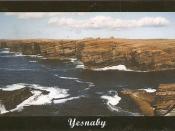'The constitutional revolution of 1782 can credibly be presented as the immediate reason for the Act of Union eighteen years later.' (Sean Connolly). Do you agree?
The act of union, one could strongly argue, is the defining event of modern Irish history. It brought into effect the United Kingdom of Great Britain and Ireland, and was a genuine, if flawed, attempt at creating a new Anglo-Irish relationship. 'The most immediately striking aspect of the history of the Irish parliament between 1767 and 1801 is surely the way that its extinction followed a quarter of a century in which its power and independence had seemingly grown.' Why was the act of union drawn up? Four major contexts have been put forward by historians within which the act of union can be understood; imperial, ancien régime, the British Constitution and the problems of 1782 settlement. This essay will discuss all these themes, and aim to illustrate, in particular, the importance of the constitutional revolution of 1782 as a reason for the act of union.
Let us firstly discuss why William Pitt and his colleagues chose to introduce such a radical and disruptive measure at this time, in terms of Britain's imperial agenda. Christopher Bayly offers a useful and interesting discussion of this point, in a paper comparing Ireland and India, extending from the late eighteenth century to early twentieth. He notes that, 'to rule these dependencies, in the late eighteenth century the British government had already developed administrative measures which also bore family resemblance to each other.' In India, Cornwallis followed through a policy, which excluded Indians and people of mixed race from major government and military offices. This of course, is very similar to the policy towards Irish Catholics, who had long been excluded from office, commissions in the British...


